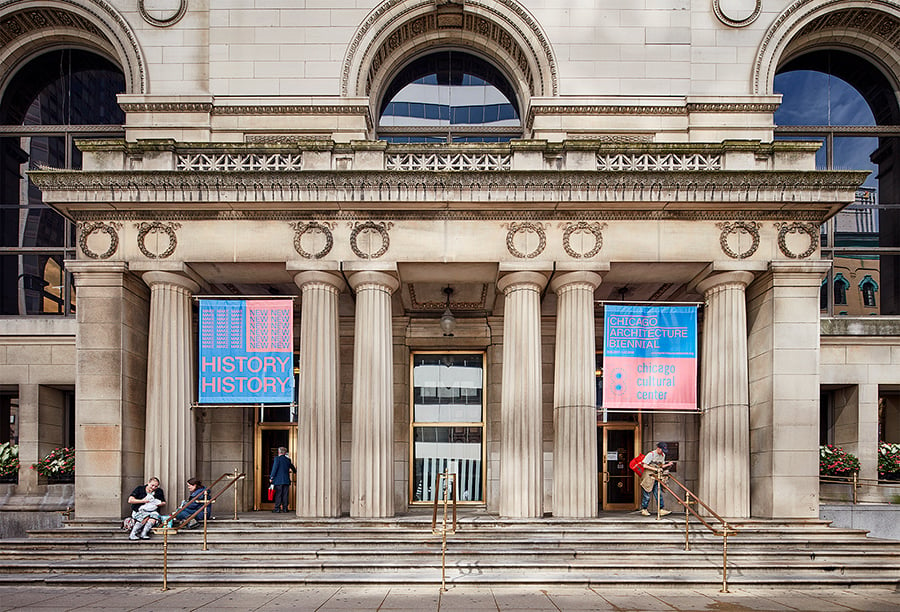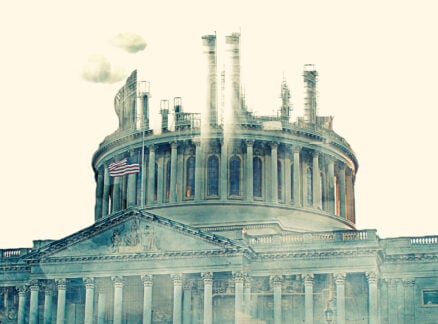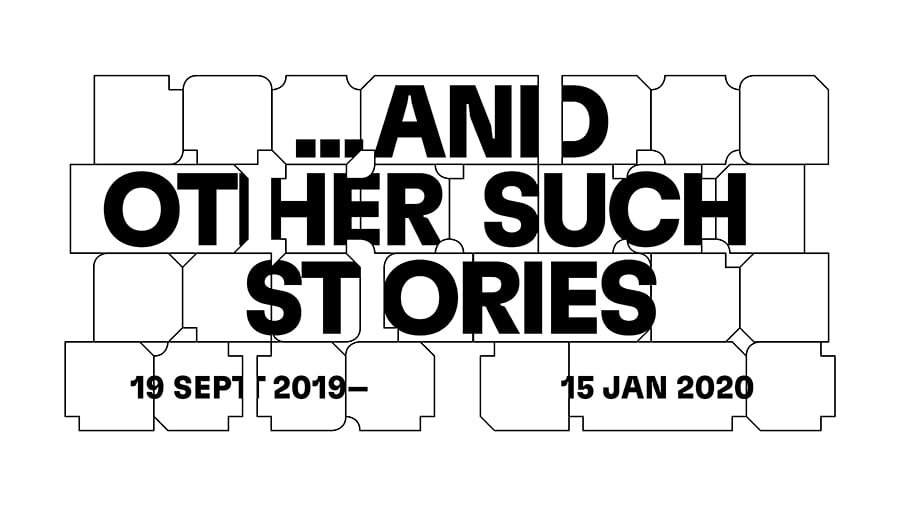
February 22, 2019
From Housing to Activism, the Next Chicago Architecture Biennial Will Bring Global Issues to Chicago
Yesomi Umolu, the artistic director of the upcoming Chicago Architecture Biennial, discusses the themes and narratives to be explored at this year’s event.
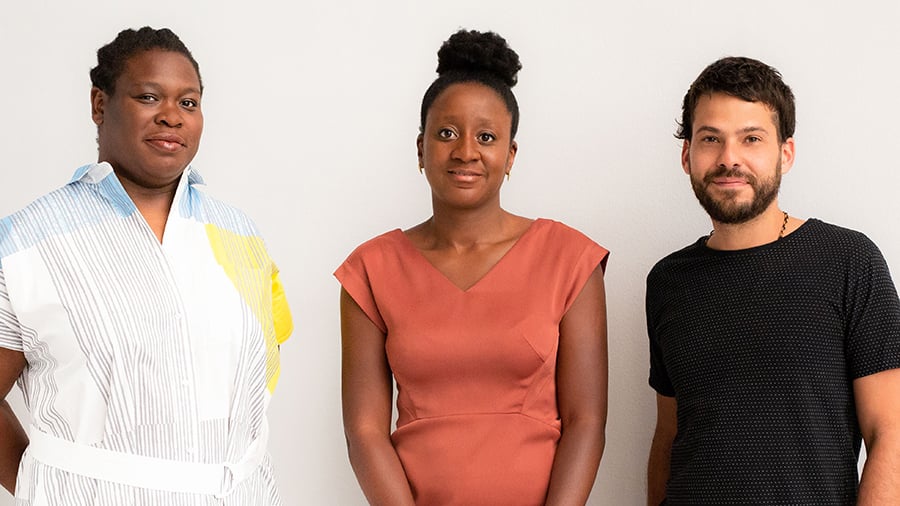
Earlier this month at a press event held in New York, the organizers behind the Chicago Architecture Biennial divulged further details of this September’s event. In addition to revealing the exhibition’s title, …and other such stories, artistic director Yesomi Umolu walked attendees through her curatorial agenda, emphasizing a global outlook that breaks with the biennial’s first two outings.
Umolu, who practiced as an architect before turning to contemporary art curation, foregrounded the research work she and collaborators Sepake Angiama and Paulo Tavares have carried out over the past year. In that vein, the trio traveled to multiple cities, gathering case studies to bring back to Chicago. (How they might be reconstituted within the halls of the Cultural Center, the biennial’s primary venue, was left unclear.) Speaking to Metropolis editor Samuel Medina, Umolu elaborates on her curatorial aims.
Samuel Medina: You have a foot in both art and architecture camps. How do you think that dual experience has shaped the biennial programming?
Yesomi Umolu: I’m not fully embedded in the discipline [of architecture] as it were. I’m obviously aware of some of the broader concerns in the field, but maybe there’s less pressure for me to address that. We’re trying to do something that is reflexive of this constellation of people that have come together around the biennial—a contemporary art curator [myself], a curator for focus and education [Sepake Angiama], and an architect [Paulo Tavares]. From there we are leaning into what we know about the world, from architecture and expanding outwards to the core concerns that everyday people and citizens are dealing with.
What are some of those concerns?
The biennial is organized around curatorial frames, the first one being “No Land Beyond,” which considers how we can re-conceptualize our thinking around land beyond commodity and property, in the narrow sense of those words. How can we think about land in relation to different values, such as sovereignty and belonging, but also nature and ecology?
The second one, “Appearances and Erasures,” proposes looking at the built environment as an archeology in which you can find different historical, social, and political residues. We should become more attuned to the multiple histories and the multiple memories that exist in the buildings and city around us.
The third frame, “Rights and Reclamations,” proposes that architecture can be used as a tool for advocacy.
Finally, the fourth frame, “Common Ground,” is about creating a space in which the public and practitioners come together. I think it expresses the analytical, methodological approach we are bringing to the biennial.
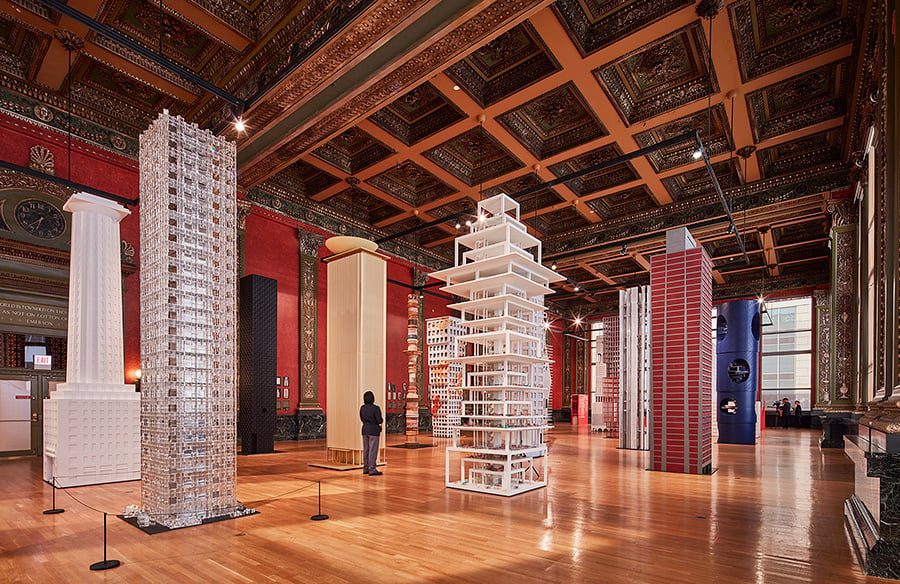
You showed a few slides of the “fieldwork” the group has done in three cities—São Paulo, Johannesburg, and Vancouver. In recent years all have become “design destinations,” so why did you feel the need to explore them?
We each have relationships to these cities. For example, Paulo has lived in São Paulo, where social movements are really trying to fight for their rights of equity in housing and living standards. It’s inspirational to see how they have occupied empty spaces in São Paulo, and it prompted us to think about how similar groups can reclaim the city for their needs.
In Johannesburg, what struck us is the recent social activism around public space and the histories of that space, which is of course related to the very divisive politics of the apartheid era. We are thinking specifically about movements such as #RhodesMustFall, which questioned the meaning of public monuments in light of this violent history, or the meaning of an institution that doesn’t account for indigenous forms of knowledge in the South African context.
And Vancouver interested us because it’s one of the first cities in North America that has [in 2014] officially declared itself on unceded land, and so acknowledging the fact that the land on which the city was built was never contracted or brokered for [from Aboriginals]. It was just taken. So Vancouver then becomes a sort of illegal occupation. This process of self-acknowledgement and welcoming voices from indigenous people is happening alongside a very pervasive form of development connecting capital between Vancouver and Asia. That’s the contradiction: On the one hand, we see how we might begin framing the discussion about valuing space differently while at the same time unleashing rampant capitalism.
We thought all these forms of activism and experiments would be meaningful to bring to Chicago.

Your presentation highlighted housing as a primary issue, one which has a particularly tragic history in Chicago. How are you planning to recast, or rehabilitate, the terms used to describe housing?
You can think about housing as a universal right to shelter. And if that’s true—that there is an intrinsic right to shelter—it has to be embedded in the framework of how we think about cities. You can’t expect people to live in cities, to trade in cities, to exchange ideas in cities, if they don’t have the basic right to shelter in those cities. And that’s something that we learned a lot about, for example in Vancouver, where the question of housing empathy is a big issue for the professional class who can no longer afford to live there. But you can also make the connection between the right to housing and the right to land. Landlessness has defined indigenous histories, which we are looking at in Brazil.
So that’s how we would like to think about it. And whether it comes out as “equitable” housing, social housing, or public housing, the common denominator of the right to shelter remains.
Lastly, the first biennial felt compelled to leave a physical legacy in the city, through a handful of semi-permanent installations. The second biennial, conversely, confined itself mostly to the halls of the Chicago Cultural Center. How will your agenda differ?
I can’t reveal too much, but in subsequent announcements you will start to see how we’re conceptualizing the different presentation bases, within the Cultural Center and beyond it. We love the spaces inside the Cultural Center, especially the ground floor—that’s where this question of “common ground” came from. It’s such an open and truly public space that you cannot fight against that. There is something special about a building where everyone and anyone, all walks of life, feels they have the right to be in that building. That creates an eclecticism and a diversity that we relish, and we want to try and find ways to support and amplify as opposed to tone down, or contain, or package. You will see in our biennial that we are leaning into that. Generally speaking, in the way that we work it is across platforms, different formats, very discursive and research-led, which includes this multi-tiered and multi-pronged approach to engagement. That’s all going to be part of the DNA of our biennial.
You may also enjoy “GAME CHANGERS: By Collaborating with Artists, Njusja de Gier Is Driving Innovation and Design at Kvadrat.”
Would you like to comment on this article? Send your thoughts to: [email protected]




